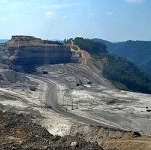 EPA Administrator Gina McCarthy unveiled a plan to regulate carbon pollution from existing power plants this morning. In a rousing speech that covered the host of risks, and opportunities, that come with a changing climate, McCarthy called the plan “part of the ongoing story of energy progress in America.”
EPA Administrator Gina McCarthy unveiled a plan to regulate carbon pollution from existing power plants this morning. In a rousing speech that covered the host of risks, and opportunities, that come with a changing climate, McCarthy called the plan “part of the ongoing story of energy progress in America.”
Blog Archives
Acting on Climate: EPA unveils carbon rule for existing power plants
Supreme Court Rejects Spruce Mine Mountaintop Removal Case

The U.S. Supreme Court says it won’t consider the case of Mingo Logan Coal Co. v. EPA, a lawsuit challenging the U.S. Environmental Protection Agency’s authority to veto mountaintop removal permits. In this case, the permits in question are for Arch Coal’s Spruce Mine No. 1 — the largest mountaintop removal project ever proposed in West Virginia.
The Deadline is Set for EPA Coal Ash Rule

By the end of this year, the EPA will finally publish the first-ever federal rule regulating the disposal of coal ash. The agency’s December 19 deadline is the result of a settlement reached today in a lawsuit brought by Earthjustice, representing Appalachian Voices, Southern Alliance for Clean Energy and other groups. The law, strong science and good public policy all support regulating coal ash as a hazardous waste. Will the EPA stand up for environmental and public health?
Fighting for Clean Water in Virginia: Standing up to Coal Industry Bullies

Today, Appalachian Voices along with our allies in Virginia filed a lawsuit against Penn Virginia, for water polluted by selenium coming from abandoned mines on their land. This lawsuit is one in a series of suits aimed at cleaning up selenium pollution in Callahan Creek.
The West Virginia Chemical Spill: A Warning for North Carolina

There is a lesson in West Virginia’s water crisis for North Carolina policymakers and regulatory agencies akin to the saying that those who do not learn from history are doomed to repeat it. If you look at the changes to and by the N.C. Department of Environment and Natural Resources in 2013 and the path ahead in 2014, the General Assembly seems resolved to run headlong down a shortsighted path that will lead to the same inevitable consequences.
The Gap Between Environmental Protection and DENR’s Skewed Self-perception

With the management of the N.C. Department of Environment and Natural Resources’ penchant for self-praise, the future must seem pretty bright. But beyond the narrative contrived in media releases, public criticism and displays of distrust in the agency’s direction have become commonplace in North Carolina’s largest newspapers and media outlets. And it’s making North Carolina’s environmental community stronger.
For Patriot Coal, Ending Mountaintop Removal is a “Win-Win”

A little more than a year ago, Patriot Coal announced it would phase out its use of mountaintop removal coal mining in Appalachia as part of a settlement with environmental groups over selenium pollution. Taken at face value, statements made at that time by Patriot’s CEO Bennett Hatfield held promise that the movement against mountaintop removal, focused on exposing the poor economics as well as the irreversible environmental impacts of the destructive practice, had reached a pivotal turning point.
A Watched EPA Never Acts: 5 Years After the TVA Coal Ash Disaster
It has been five years since the TVA Coal Ash disaster in Tennessee, which sent 1.1 billion gallons of toxic coal ash into Emory and Clinch rivers. While the nation has watched and petitioned the U.S. Environmental Protection Agency, the agency responsible for issuing federal standards for coal ash disposal, little action has been taken. Perhaps this is similar to the old adage that says “a watched pot never boils.”
Appalachia’s Economic Transition is Underway: Three Broad Strategies to Get Us There
{ Editor’s Note } Anthony Flaccavento is a regional leader in sustainable agriculture, local foods and their overlap with economic development. This is the second part of a post on building a stronger regional economy in Appalachia. Click here to…
Appalachia’s Contested History

By Bill Kovarik It has been 50 years since Harry Caudill wrote “Night Comes to the Cumberlands,” a landmark history that rejected stereotypes of Appalachian people as backward hillbillies and described the ruthless exploitation they suffered. The book spoke with…

